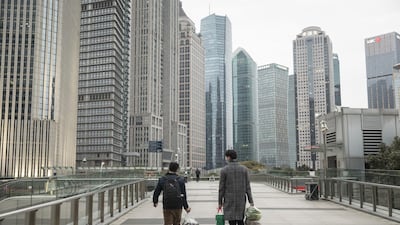Last week oil prices rose for the first time in six weeks as the market reacted to reports that suggested the economic impact of the coronavirus could be short-lived.
But shares in the world’s biggest oil companies are still trading at up to 20 per cent discounts to their pre-crisis levels. Shares in real estate companies in oil-producing countries have also taken another hit.
Without wishing to disrespect the scale of the human tragedy that has struck the Hubei province over the past few weeks, it is often the case that financial markets overreact to bad news, creating buying opportunities for investors.
Indeed these events often mark the bottom of market sell-offs, rather than the start of a greater crisis.
Wall Street has certainly taken this view over the past week, clocking up a series of all-time highs for major indices, even as the number of cases of coronavirus continued to rise at an alarming rate.
It seemed almost a callous or cruel reaction. But financial logic and precedent suggests it was probably the correct one. Commodity markets like oil, iron and copper took a more pessimistic view, but these tend to panic.
Kristalina Georgieva, the new managing director of the International Monetary Fund, said it will be two weeks more before we can be sure of whether the coronavirus has past its peak and is now under control.
On Friday Chinese foreign minister Wang Yi said the world was "overreacting" to the crisis, and that China’s counter measures were proving successful.
I remember reporting the Sars crisis back in 2003 when I wrote a commentary similar to this one. It pointed out that Hong Kong apartment prices were down 70 per cent and likely a good buy. A few people laughed.
At the time, the Grand Hyatt hotel in Hong Kong had just one paying guest, so great was the public fear of the virus. However, within five years Hong Kong property was once again the most expensive in the world, largely thanks to the economic growth in its big neighbour China.
True, Hong Kong property prices had been falling ever since the British flag came down in 1997. But the Sars outbreak in 2003 was definitely the bottom.
Yes, travel, tourism, trade, shopping, restaurants and entertainment will suffer badly in the first quarter. And cruise lines will clearly struggle to get back to business, after hosting some of the worst experiences endured by travellers in this virus outbreak.
But will the overall demand for oil from mainland China be seriously damaged for the whole of 2020?
Oil industry experts cannot reach a consensus. But it is not unreasonable to think that as soon as the lockdown of Chinese cities are over, people will drive their cars just as much as ever. Many factories have already gone back to work this week.
Further economic stimulus is also inevitable. Remember that China's response to the Global Economic Crisis in 2008-9 was a stimulus package equivalent to half its GDP, the largest in economic history.
Besides, you don’t have to take a view on this prognosis to see the opportunity with the shares in blue chip oil companies at current prices.
Shell, for example, sells for around a fifth less than it did before the crisis. It currently offers a 7 per cent dividend; and that's from a company that has not missed a dividend payment since the Second World War and is the world's largest LNG (liquefied natural gas) trader.
Incidentally, back in 2003 it took the Chinese stock market just six months to recover its losses and the overall loss to annual GDP was estimated to be 0.8 per cent.
Although both the International Energy Agency and Opec trimmed down oil demand estimates for 2020 due to the virus impact, this could improve in the second half of the year. Potential supply disruptions from Venezuela, Libya and Iran also mean that oil prices could soon resume their recovery from the slump of 2014.
Other big oil companies with shares now selling at bargain levels include: ExxonMobil, BP, Phillips 66 (a favourite of Warren Buffett) and Chevron, whose share price crashed to a new 52-week low over the past couple of weeks — bumping its dividend yield up to 4.7 per cent, the highest in many years.
However, and it is a big however, remember that global stock markets are presently richly valued, and many top investors are expecting a serious correction, so don’t get carried away.
Then again if this is a bottom for oil prices, this will likely also mark a bottom for UAE house prices as the Sars crisis did for Hong Kong in 2003. The smart money is already moving.
Emirates Strategic Investments Company, fully owned by Sheikh Mansour bin Zayed, deputy prime minister and minister of presidential affairs, announced last Tuesday that it bought a Dh1 billion, UAE mixed-use property portfolio.
This comprises more than 1,300 residential and commercial units, with an expected yield of 8 per cent. The deal was funded from a sukuk issued on the London Stock Exchange last July with a 3.939 per cent profit rate.
The Chinese word for crisis is composed of two characters signifying "danger" and "opportunity" — a very apt description.
Peter Cooper has been writing about Gulf finance for two decades

